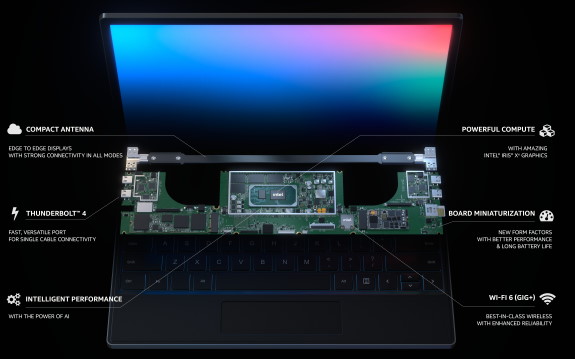
Posted on Thursday, December 17 2020 @ 18:30 CET by Thomas De Maesschalck
Intel has issued a press release about Evo Platform, basically a new Intel-verified design for laptops. It's sort of a 2020 version of Project Athena, it promises a more optimal PC experience thanks to optimizations across the ecosystem. Intel promises more performance, better responsiveness and higher battery life. The chip giant also cooked up a new Visual Sensing Controller, it uses an AI-based approach to enable new low-power capabilities and to adapt to the environment, like by automatically adjusting brightness after detecting user presence.
We live in an era where computing is pervasive in how we interact with society. From work to education to entertainment, the PC is a critical tool and more essential than ever as the global pandemic reshapes our world. This PC renaissance features new capabilities, form factors and a breadth of choice that has risen to meet our unique modern needs. It has also helped us fuel consecutive years of industry growth beyond the expectations of many.
At Intel, we've always believed the PC is an enduring device, which is why in 2018, our team set out to reinvigorate and navigate a new course for PC innovation. That was the year we started to rally our ecosystem partners in an industrywide effort to innovate beyond the central processing unit (CPU) and drive innovation across the entire platform: from silicon to software and beyond. The result? An evolved PC experience.
It's been a journey, and we are by no means done, but it's a good opportunity to reflect on how far we've come – and where we still want to go.
Looking back to 2018, our first step was to conduct deep research to understand what people want and need most from their PC. This involved our Project Athena innovation program, which taught us at the most basic level that people want a PC that can keep up with their daily needs. This means something slightly different to everyone, but our participants indicated a common need for features like high-quality touchscreens, reliable connectivity or simply improved form-factor design. Participants also made it clear what they were not willing to compromise: performance, responsiveness and battery life.
Based on this research, we needed to evolve from focusing on individual innovation – primarily at the CPU level – to co-engineering, looking at the entire platform. This meant going beyond the CPU to adjacent silicon, like graphics or connectivity, and areas like thermals, battery, display, system memory and storage. It also meant looking for ways to optimize at a software level, based on the specific operating system and the applications people use most. Finally, we took a look at any other tuning we could do across the entire stack.
By looking holistically at the entire platform, we've been able to bring together top industry experts to consider each detail, finely tuning everything to deliver the best computing experiences possible.
You can start to see the outcome of this in our new Intel® Evo™ Platform-verified designs. Leveraging our 11th Gen Intel® Core™ processors – the world's best processor for thin-and-light laptops – Intel Evo designs have been created hand-in-hand with greater than 150 partners to deliver more than 140 components for laptop designs verified to offer the best possible experience.
This massive effort involved over 1 million hours industrywide. Take for instance the opportunity we saw to extend battery life of the laptop by addressing the display, the biggest drain on power in a system. We worked with key suppliers and customers to bring the 1-watt panel to market two years ago by aggregating demand, which delivered an additional four to eight hours of battery life. Today, 75% of Evo designs are leveraging this capability. Meanwhile, nearly 40 of the new Intel Evo platform-verified designs have launched worldwide, including Acer Swift 5, Asus ZenBook Flip S, Dell XPS 13, HP Spectre x360, Lenovo Yoga 9i and Samsung Galaxy Book Flex 5G.
A new platform addition we're excited to unveil today is the Intel® Visual Sensing Controller (codenamed "Clover Falls"), a secure companion chip that helps make PCs more smart and secure through the power of Intel artificial intelligence. This companion module will first arrive in commercial systems, bringing new low-power capabilities to the PC and helping it sense and adapt to its surroundings. For example, the module could help the system automatically adjust display brightness after detecting user presence.
"Working with Intel is so much more than buying a processor that will work with our product," said Meghana Patwardhan, vice president of Dell Latitude and Mobility Products. "The co-engineering effort involves Intel's dedication to tackling unique product challenges together and taking the entirety of the system into consideration – all so we can deliver amazing new platform features to business users."
This is just one of many examples being enabled by this platform-level approach. Now more than ever the PC is an essential part of our lives, keeping us connected to the people and things we love most and helping us be productive, whenever, wherever and however we need to be. At Intel, we promise to keep innovating, to keep partnering across the industry and to keep delivering the platforms for the best PC experiences possible.
- Chris Walker is corporate vice president and general manager of the Mobile Client Platforms Group at Intel Corporation. Jim Johnson is corporate vice president and general manager of Client Engineering at Intel Corporation.


